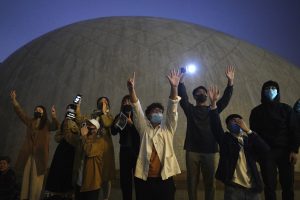According to many observers, 2019 was the year the United States finally “woke up” on the issue of China, its human rights practices, and the threat the country’s rise poses. Despite current attitudes, however, any action taken against Beijing in the new year must be carefully thought through, especially since the United States has a history of rushing into ill-advised policies in response to foreign adversaries that are counterproductive and damaging to American long-term interests.
For instance, President Donald Trump recently signed the Hong Kong Human Rights and Democracy Act. The bill seems to be an understandable reaction to the recent clampdown on pro-democracy protestors by Beijing. Nevertheless, it is important that its provisions not be used to damage the economic relationship between the United States and Hong Kong, which has over the decades been a remarkable success story.
Hong Kong has since 1992 been treated separately from China for the purposes of trade policy and other economic regulations, based on the idea that while the island may be under the jurisdiction of the mainland, it is an independent enough entity to warrant special treatment. In effect, this means more trade and closer economic relations between the United States and Hong Kong. For example, Hong Kong has been exempt from the tariffs that the Trump administration has been applying to goods coming from mainland China, a policy that helps blunt the impact of the current trade war.
The shielding of the island from disruptions in trade between the United States and China has been extremely beneficial for consumers and producers in both America and Hong Kong. In 2018, the United States had a larger trade surplus with Hong Kong than with any other country or territory in the world at $33.4 billion, with American individuals and businesses providing $82.5 billion of foreign direct investment. This reflects the economic openness that has helped transform Hong Kong into the economic success story it is today.
Unfortunately, the Hong Kong Human Rights and Democracy Act has the potential to upend these positive developments. The bill requires an annual review to determine whether Hong Kong should keep its favorable trade status under U.S. law. If it loses this status, trade between the United States and Hong Kong could significantly shrink, to the detriment of consumers and businesses on both sides.
Furthermore, Hong Kong trades with mainland China much more than it does with the United States. An American law restricting trade with Hong Kong is likely to have the unintended consequence of driving the island toward even greater economic dependence on Beijing, further cementing Communist Party control.
It is understandable that many Americans feel sympathy watching the people of Hong Kong protest against Beijing. According to Missouri Senator Josh Hawley, the struggle for Hong Kong “defines the challenge of an entire generation.” Few want to directly confront China over the issue militarily. Taking steps toward reducing American trade relations with Hong Kong seems like a reasonable compromise between doing nothing and a more direct confrontation, which explains its appeal to American leaders.
Yet, despite the near consensus within Congress in support of the Hong Kong Human Rights and Democracy Act, there is an equally strong consensus in the academic literature that sanctions simply do not work — indeed, they can be counterproductive. If greater economic difficulties within a state cause increasing unrest, authoritarian regimes can simply respond by deepening repression and further consolidating their rule. Sanctions are generally associated with increases in poverty, declines in living standards, and less democratic outcomes for the targeted country.
Scholars have come to these conclusions even when looking at relatively weak regimes such as Iraq under Saddam Hussein and Syria today. Economic coercion is even less likely to be productive against a state like China, which is by some measures now the largest economy in the world.
American politicians would like to be seen as taking decisive action in the midst of the crisis in Hong Kong. Yet it is immoral to score political points at the expense of innocent third parties, in this case the residents of Hong Kong and the Americans that benefit from trade with them. Once sanctions are enacted, inertia and political considerations can keep them in place for decades, beyond the point at which it is clear that they are not going to accomplish their goals, as has happened in the case of the Cuban embargo. It is thus important that the executive branch not begin the process of disrupting the trade relationship between the United States and Hong Kong.
The Hong Kong Human Rights and Democracy Act does nothing to strengthen the democracy movement in Hong Kong, nor does it help accomplish American strategic objectives. Now that it has been signed into law, in the new year it is important that the bill not be allowed to turn into a tool that drives Americans and the people of Hong Kong further apart.
Richard Hanania is a research fellow at the Saltzman Institute of War and Peace Studies at Columbia University.

































